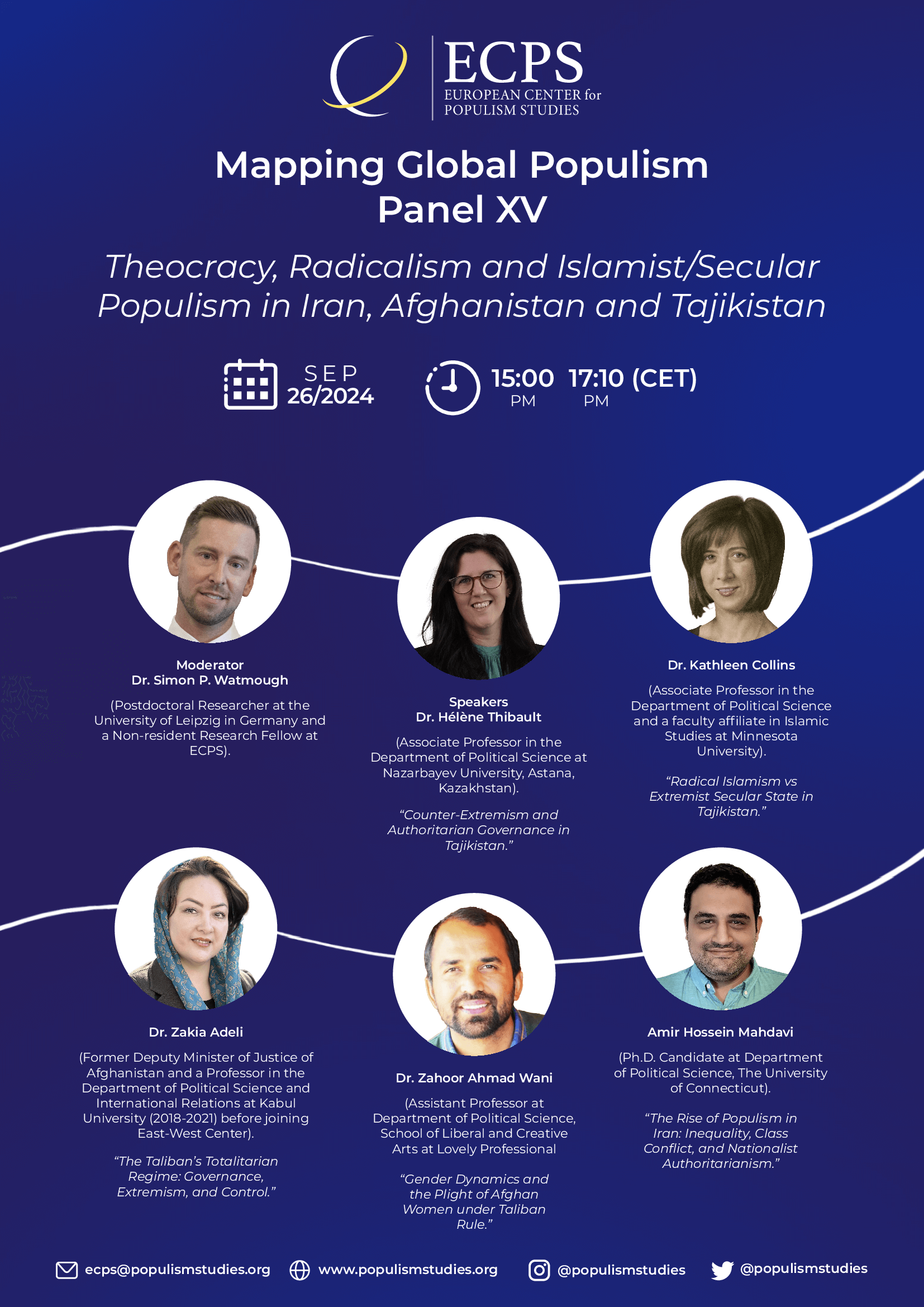Date/Time: Thursday, September 26, 2024 — 15:00-17:10 (CET)
Click here to register!
Moderator
Dr. Simon P Watmough (Postdoctoral Researcher at the University of Leipzig in Germany and a Non-resident Research Fellow at ECPS).
Speakers
“Counter-extremism and Authoritarian Governance in Tajikistan,” by Dr. Hélène Thibault (Associate Professor in the Department of Political Science at Nazarbayev University, Astana, Kazakhstan).
“Radical Islamism vs Extremist Secular State in Tajikistan,” by Dr. Kathleen Collins (Associate Professor in the Department of Political Science and a faculty affiliate in Islamic Studies at Minnesota University).
“The Taliban’s Totalitarian Regime: Governance, Extremism, and Control,” by Dr. Zakia Adeli (Deputy Minister of Justice of the Islamic Republic of Afghanistan and a Professor in the Department of Political Science and International Relations at Kabul University (2018-2021) before joining East-West Center).
“Gender Dynamics and the Plight of Afghan Women under Taliban Rule,” by Dr. Zahoor Ahmad Wani (Assistant Professor at Department of Political Science, School of Liberal and Creative Arts, Lovely Professional University).
“The Rise of Populism in Iran: Inequality, Class Conflict, and Nationalist Authoritarianism,” by Amir Hossein Mahdavi (Ph.D. candidate at Department of Political Science, University of Connecticut).
Click here to register!

Brief Biographies and Abstracts
Dr. Simon P. Watmough is a postdoctoral researcher at the University of Leipzig in Germany and a non-resident research fellow in the research program on authoritarianism at ECPS. He was awarded his Ph.D. from the European University Institute in April 2017 with a dissertation titled “Democracy in the Shadow of the Deep State: Guardian Hybrid Regimes in Turkey and Thailand.” Dr. Watmough’s research interests sit at the intersection of global and comparative politics and include varieties of post-authoritarian states, the political sociology of the state, the role of the military in regime change, and the foreign policy of post-authoritarian states in the Middle East and Southeast Asia. His work has been published in Politics, Religion & Ideology, Urban Studies and Turkish Review.
Counter-extremism and Authoritarian Governance in Tajikistan
Dr. Hélène Thibault is Associate Professor in the Department of Political Science at Nazarbayev University. Her research focuses on the politics of Central Asia as well as gender and religious identities. Recent publications include co-edited volumes Uyat and the Culture of Shame in Central Asia and The Political Economy of Education Research in Central Asia (open-access) at Palgrave. Current projects on the repatriation of Central Asian foreign terrorist fighters and the decriminalization of sex work in Central Asia are under way.
Radical Islamism vs Extremist Secular State in Tajikistan
Dr. Kathleen Collins is a Professor in the Department of Political Science and a faculty affiliate in Islamic Studies. She received her Ph.D. from Stanford University in Political Science with a focus on Russia and Muslim Eurasia. Collins received her B.A., summa cum laude, and Phi Beta Kappa, with a dual major in Russian Language and Literature and Government and International Studies from the University of Notre Dame. She also studied Uzbek and Turkish in graduate school. Professor Collins is the author of Clan Politics and Regime Transition in Central Asia (Cambridge University Press), which won the Central Eurasian Studies Society Award for the Best Book in the Social Sciences on Central Eurasia, 2008. Her second book is Politicizing Islam in Central Asia: From the Russian Revolution to the Afghan and Syrian Jihads (Oxford University Press, 2023).
The Taliban’s Totalitarian Regime: Governance, Extremism, and Control
Dr. Zakia Adeli was the Deputy Minister of Justice of the Islamic Republic of Afghanistan and a Professor in the Department of Political Science and International Relations at Kabul University (2018-2021) before joining East-West Center. With more than ten years of master’s and bachelor’s degree teaching experience at Kabul University. She was a member of the Preparatory Contact Committee for Peace with the Taliban in 2019 in Doha, Qatar, and also served on many senior government commissions in the Government of the Islamic Republic of Afghanistan, including the High Commission for the Protection of Human Rights Defenders of Afghanistan, High Council of Women of Afghanistan, High Commission for the Prevention of Violence Against Women, Political Parties and Civil Society Commission of the Supreme National Reconciliation Council of Afghanistan, and The Commission on Women and Human Rights of the Supreme National Reconciliation Council of Afghanistan.
Dr. Adeli was a member of the leadership board of the Afghan Red Crescent Society from 2020 to 2021 and has played a key role in reviewing and rewriting the organization’s charter. From 2017 to 2021 she was the chairman of the research committee of the Faculty of Law and Political Science of Kabul University and from 2014 to 2017 she was the Dean of the Faculty of Political Science of Katib University. She was the head of the Department of Women Studies of the Andisheh Foundation (2015-2021) and carried out significant activities in promoting the capacity of women and gender equality in Afghanistan. In 2018, she designed and hosted the first National Conference on the Status of Women in Afghanistan, and was a member of the Central Committee for the 2018 National Consensus on Women for Peace.
Dr. Adeli worked as a Senior Officer at the Danish Committee for Aid to Afghan Refugees (DACCAR), a leading Danish organization in Afghanistan from 2002 to 2003 and has also provided valuable services to Afghan immigrants in Iran, including designing and establishing the first public library for immigrants in Iran with the help of the UN High Commission for Refugees (UNHCR), securing admission for 300 needy Afghan immigrant students to Birjand University, and establishing and managing a refugee cultural complex in Iran.
Dr. Adeli also served as Deputy Editor-in-Chief of Negah-e Moaser, Editor-in-Chief of Contemporary Thought, Katib Magazine and a member of the editorial board of Katib, Foreign Policy and Middle East Studies from 2013 to 2021. She is the author of three books: UN Security Council and Afghanistan Developments (2007), Postcolonial Situation and the Multiplicity of Afghan Constitutions (2015), and First National Conference pamphlet on Studying the Status of Women in Afghanistan (2009). Dr. Adeli has also written more than thirty scientific articles including: Investigating the Convergence Factors of Afghanistan and South Asian Countries (Foreign Policy Quarterly, 2020), Evolution of diplomacy in Islam and international law (Scientific Journal of Kabul University, 2017), A Comparative Study of the Electoral Laws of Afghanistan in 1964 and 1985 (Quarterly Journal of Contemporary Thought, 2016), Typology of Afghan Constitutions in the Light of the Constitutions (Middle East Research Quarterly, 2016), Pathology of Democracy in Afghanistan (Katib University Quarterly, 2015), UN Security Council Perspectives on the Role of Women in Peace (Foreign Ministry Strategic Studies Quarterly, 2014), The fragility of democracy in Afghanistan (Zahir Shah period and the new period) (Journal of International Relations Research, 2013), How to hold women back from the post-colonial perspective, (World Summit on Women and the Islamic Awakening, 2012), and Good Governance in Farabi Thought (Scientific Journal of Islamic Azad University, 2005).
Abstract: The Taliban’s regime exemplifies a totalitarian system. The consolidation of power and control is facilitated through the instrumental usage of religion. Democratic institutions were dismantled by the Taliban, who replaced them with a centralized non-electoral system led by one authority. The Taliban’s totalitarian regime is characterized by eliminating opposition groups and political parties, suppression of civil society and media, limiting freedoms, and interference in private life. Under the Taliban regime, women face severe restrictions on their rights, such as limitations on education, employment, and even dress code. The eradication of customs such as Nawroz celebration and music, along with imposing the ruler’s language, demonstrates the elimination of cultural manifestations. The presentation analyzes these elements and their influence on governance and life during the Taliban regime.
Gender Dynamics and the Plight of Afghan Women under Taliban Rule
Dr. Zahoor Ahmad Wani is an Assistant Professor in the Department of Political Science, Lovely Professional University, Jalandhar, Punjab and a Deputy Editor of South Asia Research (SAGE). He obtained his PhD (2018) from the Central University of Gujarat on the dynamics of the geopolitical triangle involving India, Pakistan and Afghanistan since 2001. His areas of teaching and specialisation, apart from Kashmir Studies, include international politics, political theory and north-western South Asia. He has written about Afghanistan’s Taliban Puzzle, geopolitics of Afghanistan-India-Pakistan triangle, critical theory and Gender and neo-liberalism.
Abstract: After a prolonged armed conflict with the USA-led NATO forces, which lasted twenty years, the Taliban re-took power and authority in Afghanistan in August 2021, removing NATO and the Afghan National Security Forces (ANSF) and immediately declaring Afghanistan an Islamic Emirate. This article examines the impacts of this change of guard in Kabul, specifically analysing the changed condition of Afghan women, the primary victims of this regime change, which is symbolic as well as harshly real. The article argues that the Taliban reconstructs ethno-religious state fundamentally undermines women’s rights and freedoms, confining them to a subordinate status and radically affecting their quality of life. While challenging the normalised form of state because of their ideological rigidity, exclusivity and political conservatism, the Taliban’s unconstitutionally and repressive way of re-establishing its rule and authority to achieve political objectives determines how civilians live their lives, particularly women through their constructed structures, norms and practices of rule. Women who are peacefully protesting for their rights while marching through the streets of Kabul and other neighboring cities are being arrested and beaten as a result of the Taliban’s strict laws and practices.
The Rise of Populism in Iran: Inequality, Class Conflict, and Nationalist Authoritarianism
Amir Mahdavi is a PhD candidate in Political Science at the University of Connecticut. His research focuses on the political economy of authoritarian regimes, with an emphasis on the Middle East. He holds two master’s degrees, one in Middle Eastern Studies from Harvard University and another in History from Brandeis University. In addition to publishing a book chapter and two peer-reviewed journal articles, his analyses of political affairs have appeared in The Washington Post, The Guardian, Foreign Affairs, and Al-Monitor. Before pursuing graduate studies in the US, he worked as a journalist and editor in Iran.
Abstract: What dynamics of Iran’s sociopolitical climate contribute to the rise of populism? I argue that distributive desires, stemming from inequality-based class conflict, and the widespread demand for a nationalist, authoritarian order serve as the respective foundations for left- and right-wing populism in Iran. Two major factors fueling leftist-populist discourse include the unprecedented rise in impoverished populations over the past five years and extreme income inequality, with the ratio between the top 1% and the bottom 10% being higher than in most developed nations, approaching levels seen in the United States. Additionally, the government’s growing inability to deliver public services, along with the failure of major political factions to improve state functionality, has paved the way for right-wing nationalist populist platforms.


